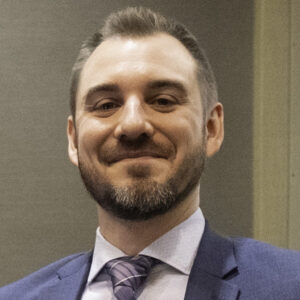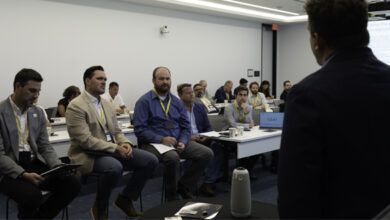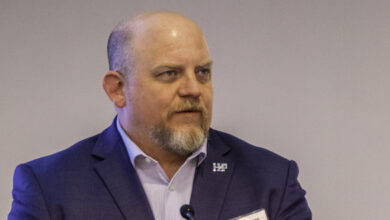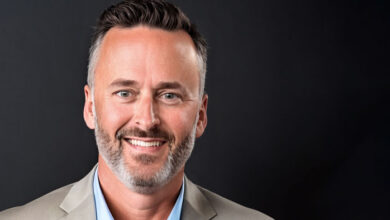Adam Keith, Patterson-UTI: Forging a path from floorhand to MPD champion

By Stephen Whitfield, Senior Editor
Growing up in the Houston suburb of Klein, music was Mr Keith’s main passion. He taught himself piano and guitar, and he formally studied trumpet as a kid. He even got a chance to play at Carnegie Hall as part of a high school trip to New York City. When it came to choosing a career, however, Mr Keith opted for the oilfield – a choice he deemed to be more practical – and studied petroleum engineering at Texas A&M University.
Since joining the industry 13 years ago, he has built a flourishing career for himself in the drilling industry, with an expertise focused on managed pressure drilling (MPD). He now serves as MPD Product Champion at Patterson-UTI Drilling and as Chairman of the MPD Subcommittee within IADC’s UBO/MPD Committee. In both roles, he sees his flexibility and thirst for knowledge as instrumental to success.
“Adaptability and versatility are paramount to someone being successful in any career, including this one,” he said. “I love learning. I’m very interested in learning new things. People who want to learn and are hungry for knowledge, people who want to apply new skills and look at problems in different ways, are always going to be an asset.”
During summers while he was studying at Texas A&M University, Mr Keith did whatever he could to earn money for his schooling. He took trumpet-playing jobs. He helped build fences for ranchers in College Station. One summer, he even sold educational books door-to-door out of the back of his Nissan Altima in the middle of rural Iowa and Minnesota.
He also made sure to get his foot into the oil and gas industry. For example, a summer internship at Tetra Technologies gave him experience with evaluating and compiling well data digitally. In another summer, he landed a full-time roughnecking gig, working on a drilling rig in South Texas as a floorhand, performing duties that crossed over into several roles.
Not surprisingly, Mr Keith said his time as a roughneck proved vital to his later career development.
“Roughnecking over the summer was absolutely invaluable as a springboard to my success,” he said. “It allowed me to actually see all the equipment and processes on the rig, and that helped to connect all the dots between the theory I was learning in school and the reality of how things actually worked in the field. It also taught me how to communicate effectively with different teams, whether you’re talking to engineers in the office, operators, or guys in the field.”
His experience with MPD began immediately upon graduating in 2012, when he went to work as an engineer at drilling technology company. The company was acquiring an MPD product line at the time and needed a young, motivated engineer who could handle the foundational work to build a service structure off of that product line. This meant writing operating manuals, procedures, and implementing the development of the product line within the company.
Even though Mr Keith had no practical experience with MPD, or even well control, he was willing to learn and do the grunt work. Moreover, his past experiences had prepared him to be adaptable.
“My petroleum engineering degree gave me a leg up, and when I went out into the field, I knew what the guys were doing,” he said. “Even though I’d never seen or used MPD, I already understood concepts like how surface pressure affected equivalent mud weight. With that foundation, I was able to jump start things in MPD, and my interest grew organically out of that.”
One of the ways Mr. Keith dealt with the learning curve on the job was by asking fundamental questions on topics not covered in his studies or roughnecking experience, like field terminology and procedures. He said he still practices this approach: asking straightforward questions in meetings to encourage open dialogue and ensure everyone understands a concept.
“It’s not uncommon for there to be confusion around what qualifies as MPD, which can lead to the unintended use of equipment outside its intended scope, or insufficient planning for the specific risks that can introduce. One of the biggest parts of my role now is raising awareness to the appropriate industry standards and make sure we’re all doing the right thing,” he said.
In 2020, Mr Keith joined Patterson-UTI Drilling in his current position, MPD Product Champion. As Patterson-UTI’s MPD subject matter expert, his responsibilities involve auditing third-party MPD operations on rigs, developing relevant MPD policies, and overseeing Patterson-UTI’s MPD product line and business.
“We just want to make sure MPD is being installed and used safely—that the operator has a solid plan in place and that we’re holding ourselves to a consistent standard. Everyone should be doing their part and following those expectations to the best of their ability,” he said.
IADC has also played an important role in Mr Keith’s career; in November 2024, he was presented with an IADC Exemplary Service Award at the association’s Annual General Meeting. The award recognized, among other things, his deep involvement with curriculum development for IADC’s industry accreditation programs, including the RigPass Accreditation Program Update, the RigPass and Basin United blended Accreditation Program, WellSharp Unconventional Well Control Content Development and the WellSharp Test Question Revision.
In 2024, he was elected as Vice Chair of the IADC MPD Subcommittee, which operates under the IADC UBO/MPD Committee, and became Chair in 2025. In that role, he has helped spearhead the committee’s work in revising API RP 92M, recommended practices addressing MPD operations with surface back pressure. He also works on API RP 79-2 and RP 79-3, participates in ISO TC 67/SC 4/WG 1 for developing international standards for the oil & gas industry, and has authored multiple patents.
“One of the initiatives we’re looking at with these RPs is equipment specs,” he noted. “The 92 series talks a lot about operational practices, but we’re looking at making something that allows us to better spec out equipment. We also want to better define what MPD is: What actions technically constitute MPD? What should or shouldn’t you be doing? The industry still sees a lot of issues in misinterpreting what MPD is, or misappropriating equipment or practices on the rig. The goal of writing the 92 series to help the industry be more explicit with defining the right way to do these things.”
The subcommittee formed a task group to review 92M in late 2024, following a preliminary industry comment period, and proposed revisions from that task group will likely be officially submitted to the wider industry for a ballot by the end of this year. A revised 92M is expected to be published sometime in 2026; thereafter, the subcommittee will begin revising 92S. DC





